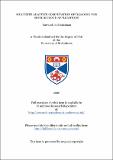Files in this item
Multisite adaptive computation offloading for mobile cloud applications
Item metadata
| dc.contributor.advisor | Barker, Adam David | |
| dc.contributor.author | Sulaiman, Dawand Jalil | |
| dc.coverage.spatial | xx, 198 p. | en_US |
| dc.date.accessioned | 2020-09-14T10:50:18Z | |
| dc.date.available | 2020-09-14T10:50:18Z | |
| dc.date.issued | 2020-12-01 | |
| dc.identifier.uri | https://hdl.handle.net/10023/20618 | |
| dc.description.abstract | The sheer amount of mobile devices and their fast adaptability have contributed to the proliferation of modern advanced mobile applications. These applications have characteristics such as latency-critical and demand high availability. Also, these kinds of applications often require intensive computation resources and excessive energy consumption for processing, a mobile device has limited computation and energy capacity because of the physical size constraints. The heterogeneous mobile cloud environment consists of different computing resources such as remote cloud servers in faraway data centres, cloudlets whose goal is to bring the cloud closer to the users, and nearby mobile devices that can be utilised to offload mobile tasks. Heterogeneity in mobile devices and the different sites include software, hardware, and technology variations. Resource-constrained mobile devices can leverage the shared resource environment to offload their intensive tasks to conserve battery life and improve the overall application performance. However, with such a loosely coupled and mobile device dominating network, new challenges and problems such as how to seamlessly leverage mobile devices with all the offloading sites, how to simplify deploying runtime environment for serving offloading requests from mobile devices, how to identify which parts of the mobile application to offload and how to decide whether to offload them and how to select the most optimal candidate offloading site among others. To overcome the aforementioned challenges, this research work contributes the design and implementation of MAMoC, a loosely coupled end-to-end mobile computation offloading framework. Mobile applications can be adapted to the client library of the framework while the server components are deployed to the offloading sites for serving offloading requests. The evaluation of the offloading decision engine demonstrates the viability of the proposed solution for managing seamless and transparent offloading in distributed and dynamic mobile cloud environments. All the implemented components of this work are publicly available at the following URL: https://github.com/mamoc-repos | en_US |
| dc.language.iso | en | en_US |
| dc.publisher | University of St Andrews | |
| dc.subject | Computation offloading | en_US |
| dc.subject | Mobile cloud computing | en_US |
| dc.subject | Mobile edge computing | en_US |
| dc.subject | Multisite offloading | en_US |
| dc.subject | Android applications | en_US |
| dc.subject | Multicriteria decision making | en_US |
| dc.subject.lcc | QA76.59S8 | |
| dc.subject.lcsh | Mobile computing | en |
| dc.subject.lcsh | Mobile apps | en |
| dc.subject.lcsh | Cloud computing | en |
| dc.subject.lcsh | Edge computing | en |
| dc.title | Multisite adaptive computation offloading for mobile cloud applications | en_US |
| dc.type | Thesis | en_US |
| dc.contributor.sponsor | University of St Andrews. School of Computer Science | en_US |
| dc.type.qualificationlevel | Doctoral | en_US |
| dc.type.qualificationname | PhD Doctor of Philosophy | en_US |
| dc.publisher.institution | The University of St Andrews | en_US |
| dc.identifier.doi | https://doi.org/10.17630/10023-20618 |
This item appears in the following Collection(s)
Items in the St Andrews Research Repository are protected by copyright, with all rights reserved, unless otherwise indicated.

